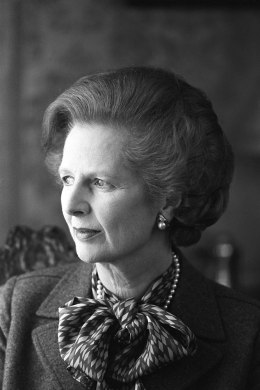
Whatever you thought of Margaret Thatcher — and during an unbroken stretch in office from 1979 to ’90, the former Prime Minister, who died on April 8 after a stroke at the age of 87, attracted both passionate support and deep loathing — you never doubted her force of will. The Iron Lady showed her mettle again and again, wrenching Britain, often brutally, out of a malaise and sense of all-encompassing failure that had blighted it for much of the era after the end of World War II. This meant not only facing down opponents but also critics in her own party, who ran scared as the strong economic medicine she prescribed sickened swaths of voters. “To those waiting with bated breath for that favorite media catchphrase, the U-turn, I have only one thing to say,” she declared at the 1980 Conservative Party conference. “You turn if you want to. The lady’s not for turning.”
In the first few years of her first term in office, Thatcher squeezed inflation out of the British economy and made plain that those enterprises that could not compete in the modern world would not be rescued, as had been the case under her predecessors. As unemployment climbed and riots broke out in the cities, her position appeared precarious. But by 1982, the economy was beginning to show the first signs of life. That spring, she refused to accept that the Argentine invasion of the Falkland Islands was a done deal and dispatched her armed forces across the Atlantic to fight a fierce little war. Triumphant, she won re-election in 1983 and then took on the coal miners — the vanguard of the old left-wing English working class — crushing them in a yearlong strike.
Throughout the 1980s, she was Ronald Reagan’s ideological soul mate, and together they reinvigorated political conservatism. By refusing to believe that history moved in only one direction, they led a challenge to Soviet communism that in the end saw its fall. Yet in a curious sense, the end of the Cold War was also Thatcher’s political undoing. She would not accept that a new, post-Soviet architecture was needed in Europe. Her obdurate stand against the continent’s closer political and economic integration helped foster divisions in her own party that would eventually lead to her ouster, in November 1990.
It was a rare defeat for someone who had beaten Britain’s class system and dusty attitudes to women in the workplace to rise to the summit of public life. As the first female Premier not only of Britain but also of any leading industrial democracy, Thatcher forged a template by which women anywhere might measure their ambitions.
